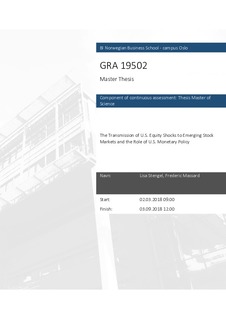The Transmission of U.S. Equity Shocks to Emerging Stock Markets and the Role of U.S. Monetary Policy
Master thesis
Permanent lenke
http://hdl.handle.net/11250/2578538Utgivelsesdato
2018Metadata
Vis full innførselSamlinger
- Master of Science [1621]
Sammendrag
This master thesis examines the equity return connectedness between the U.S. and
12 emerging market countries between 1994 to 2017, applying a network approach
based on variance decompositions from a vector autoregressive model (VAR),
proposed by Diebold and Yilmaz (2012). Our findings suggest that return spillovers
between the countries exist in varying strength, and that overall spillovers increase
in crisis periods. There is empirical evidence for the existence of two regional
connectedness clusters, one in Asia and one between the U.S. and Latin America.
The majority of emerging market countries are net receivers of equity shocks
whereas the U.S. and Mexico play the largest role in transmitting directional shocks
to other markets. Financial integration significantly determines return spillovers
from the U.S. to emerging markets which provides support for the portfolio channel
theory. Finally, the reaction of countries to shocks arising from U.S. monetary
policy surprises is widely consistent with our spillover analysis. Our results suggest
that Mexico and Brazil are most sensitive
Beskrivelse
Masteroppgave(MSc) in Master of Science in Business, Finance/Master of Science in Finance - Handelshøyskolen BI, 2018
